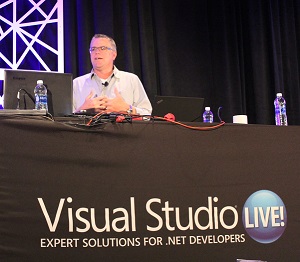News
The Evolving Role of the Developer
While technology continues to evolve at a dizzying pace, the roles of those who work with technology continue to evolve as well. The role of developers has become more prominent over the last several years as they've been tasked with supporting an expanding array of devices and continuously improving the UX. This is the new face of application development. Jay Schmelzer, director of Program Management for the Visual Studio Team at Microsoft, opened Visual Studio Live! in Chicago with the Tuesday morning keynote entitled, "Modern Application Development with Visual Studio, .NET and Azure."
Schmelzer led the attendees through what he called a "whirlwind tour of latest of development tools and platforms." He started off putting things in context by describing how he sees the role of application developers as having changed. "Over the last 20 years, our role as developers has really evolved from being the folks put in the basement supporting things behind the scenes to now playing a critical role in future success of the organization," he said.
 Jay Schmelzer at Visual Studio Live!
Jay Schmelzer at Visual Studio Live!
Of course, that also means the demands on developers have evolved. "We're being asked to work across different operating systems and devices, work faster and get to market quicker," he said. That evolution is what drives the development tools division at Microsoft. "We're creating tools and runtimes that allow you to do that -- to work more productively and more quickly."
That evolution is of course not occurring in a vacuum. He also described similar changes in other industries, like how Skype has changed communications and Uber and Lyft have changed transportation. He opined that "Every company is a software company, regardless of their core product." He supported that statement with an example of a trucking company that had developed facial recognition to expedite driver check-in and increase security.
And the focal point is the user. "This is all becoming more centered around individual user, making sure [apps] work on all form factors, whether that's a phone or tablet or PC," he said. What is critical is to provide mobility for the user experience. "The experience, or what I am trying to do, is moving with me as I transfer between devices. The workflow is transitioning with me."
As new technologies emerge, the development practices that support them must also keep pace. "A lot of people are talking about intelligent apps, voice recognition, AI and those kind of things. How do we use data to create intel experience? How do we make Visual Studio itself more intelligent? How we can we use our knowledge of your app to help figure out ways to make you more productive?"
What is bringing this together, he said, is having the computing power available through the cloud. "You can stand up the infrastructure you need without having to wait months to provision resources to run the apps or even just experiment," he says. "So that's the context."
And with that established, he moved into demos of some of Microsoft's prominent development tools. "Let's start with .NET," he said. "Today that platform is available everywhere. You can take your skills and apply them anywhere."
There are currently three primary versions of .NET: the classic .NET framework for Windows and Linux apps; the open source and cross-platform .NET Core; and Xamarin for bringing the same .NET development experience to mobile devices. He emphasized that all three are an equal priority for Microsoft. "None are more important than the other," he said.
And Visual Studio is designed for that integrated experience, said Schmelzer. "You're sharing that C# code and using that common framework. Together they create this unified platform."
Then he moved on to a demo of .NET Core and Visual Studio. "Let's spin up a Web app," he said, while explaining how Microsoft cleaned up the experience and tried to make it easier to understand what's going on in all open projects.
"Developers are at the heart of what we do," says Schmelzer. "We want to make developers more productive. So one other big theme is this notion of 'shift left.' The further to right you get, it gets more expensive to find problems. If you shift left, you're closer to your inner loop experience, closer to when you're actually writing the code."
He then demoed a function that supports that philosophy, which is live unit testing that Microsoft introduced in latest version of Visual Studio. He also demoed other new functions and technologies like code styles and how Visual Studio works with containers.
He wrapped up with a brief discussion the emergence of mobile development and some of its unique challenges. "The mobile app becoming your connection to your customer," he says. "Tools like Xamarin help you build first class apps and get to market faster." Mobile development has its own unique challenges like testing apps against the vast matrix of device types and OSes. Using the cloud helps resolve those challenges. Microsoft's Xamarin Test Cloud presents more than 2,000 devices to test mobile apps.
The next Visual Studio Live! events this year are in Anaheim, Calif., Oct. 16-19, and as part of Live! 360 in Orlando, Nov. 12-17.
About the Author
Lafe Low is the editorial liaison for ECG Events.